
Since its establishment in 1947, Pakistan has had an asymmetric federal government and is a federal parliamentary democratic republic. At the national level, the people of Pakistan elect a bicameral legislature, the Parliament of Pakistan. The parliament consists of a lower house called the National Assembly, which is elected directly, and an upper house called the Senate, whose members are chosen by elected provincial legislators. The head of government, the Prime Minister, is elected by the majority members of the National Assembly and the head of state, the President, is elected by the Electoral College, which consists of both houses of Parliament together with the four provincial assemblies. In addition to the national parliament and the provincial assemblies, Pakistan also has more than five thousand elected local governments.
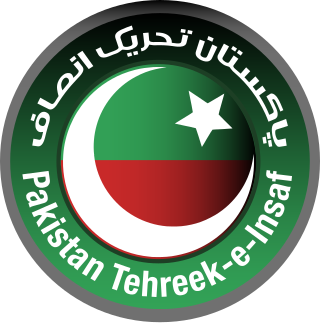
The Pakistan Tehreek-e-Insaf is a political party in Pakistan. It was founded in 1996 by Pakistani cricketer-turned politician Imran Khan, who served as the country's prime minister from 2018 to 2022. The PTI is one of the three major Pakistani political parties alongside the Pakistan Muslim League–Nawaz (PML–N) and the Pakistan People's Party (PPP), and it is the largest party in terms of representation in the National Assembly of Pakistan since the 2018 general election. With over 10 million members in Pakistan and abroad, it claims to be the country's largest political party by primary membership as well as one of the largest political parties in the world.
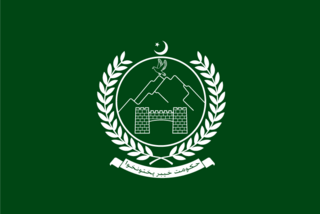
The Chief Minister of Khyber Pakhtunkhwa is the head of government of the Pakistani province of Khyber Pakhtunkhwa. The chief minister leads the legislative branch of the provincial government, and is elected by the Provincial Assembly. Given that he has the confidence of the assembly, the chief minister's term is for five years and is subject to no term limits. Azam Khan is the current caretaker chief minister of Khyber Pakhtunkhwa.
Law enforcement in Pakistan is one of the three main components of the criminal justice system of Pakistan, alongside the judiciary and the prisons. The country has a mix of federal, provincial and territorial police forces with both general and specialised functions, but the senior ranks of all the provincial forces and most of the federal ones are manned by members of the Police Service of Pakistan (PSP). The PSP is one of the most prestigious parts of the Central Superior Services, Pakistan's main civil service organisation. Federal law enforcement agencies are generally overseen by the Ministry of Interior of the Government of Pakistan, while provincial police forces are overseen by a department of the government of that province.
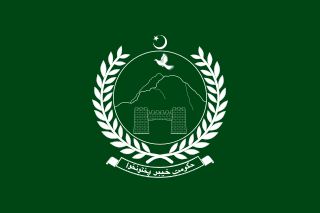
The Provincial Assembly ofKhyber Pakhtunkhwa is a unicameral legislature of elected representatives of the Pakistani province of Khyber Pakhtunkhwa, which is located in Peshawar, the provincial capital. It was established under Article 106 of the Constitution of Pakistan, having a total of 145 seats, with 115 general seats, 26 seats reserved for women and 4 reserved for non-Muslims. The 11th Provincial Assembly of the Khyber Pakhtunkhwa was dissolved on 18 January 2023, and the province is set to elect a new legislature on 8 October 2023.

The Election Commission of Pakistan is an independent, autonomous, permanent and constitutionally established federal body responsible for organizing and conducting elections to the national parliament, provincial legislatures, local governments, and the office of President of Pakistan, as well as the delimitation of constituencies and preparation of electoral rolls. As per the principles outlined in the Constitution of Pakistan, the Commission makes such arrangements as needed to ensure that the election is conducted honestly, justly, fairly and in accordance with law, and that corrupt practices are guarded against. The Election Commission was formed on 23 March 1956 and has been restructured and reformed several times throughout the history of Pakistan.

An indirect presidential election was held on 6 September 2008 in Pakistan. The Electoral College of Pakistan – a joint sitting of the Senate, National Assembly and Provincial Assemblies – elected a new president after the resignation of President Pervez Musharraf. As required by the constitution, Muhammad Mian Soomro automatically became acting president on 18 August 2008, upon the resignation of Musharraf. The constitution required that a new president be elected by Parliament within 30 days; Soomro was considered loyal to Musharraf, and it was considered certain that he would be replaced in that election.

The Chief Minister of Balochistan is the head of government of the Pakistani province of Balochistan. The chief minister leads the legislative branch of the provincial government, and is elected by the Provincial Assembly. Given that he has the confidence of the assembly, the chief minister's term is for five years and is subject to no term limits. Abdul Quddus Bizenjo is the current chief minister of Balochistan.
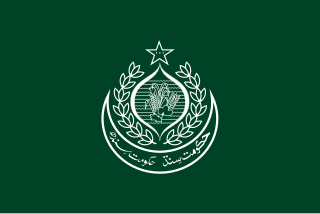
Chief Minister of Sindh, is the elected head of government of Sindh. Syed Murad Ali Shah is a PPP politician and the current Chief Minister of Sindh.

Presidential elections were held on 30 July 2013 in Pakistan to elect the 12th President of Pakistan. Incumbent President Asif Ali Zardari’s term was scheduled to expire on 8 September 2013; and as such, Article 41 of the Constitution of Pakistan required the elections to be held no later than 8 August 2013. The Electoral College of Pakistan – a joint sitting of the Senate, National Assembly and Provincial Assemblies – were tasked with electing a new president to succeed President Zardari, who declined to seek a second term in office. After the Pakistan Peoples Party and its allies boycotted the presidential election, the two candidates were Mamnoon Hussain backed by the Pakistan Muslim League (N), and Wajihuddin Ahmed backed by Pakistan Tehreek-e-Insaf. Agra-born Hussain was elected president by a majority securing 432 votes. The elections were the first time in Pakistani history where a civilian president was elected while an incumbent civilian President was still in office, completing a historic and democratic transition of power that began with the 2013 General Elections.

Senate elections were held in Pakistan on 5 March 2015 to elect the replacements for 52 retiring senators. Those retiring include chairman Nayyar Hussain Bukhari and deputy chairman Sabir Ali Baloch of the upper house. Pakistan Peoples Party (PPP), the majority party in Senate, would lose 21 members, followed by Pakistan Muslim League Nawaz would lose 9 and Awami National Party would lose 6 members.

Presidential elections were held in Pakistan on 4 September 2018. The elections saw Arif Alvi of PTI being elected as the 13th President of Pakistan after defeating Fazal-ur-Rehman of MMA and Aitzaz Ahsan of PPP. Although the incumbent President Mamnoon Hussain, whose term was to expire on 9th September 2018, was eligible for re-election, he declined to take part.
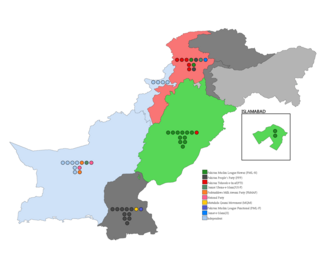
The triennial Senate Electionsof Pakistan were held on 3 March 2018 to replace 52 retiring senators - half of the Senate's strength - with the winning candidates serving six-year terms. Overall, Pakistan Muslim League (N) came out as the largest party, followed by the Pakistan Peoples Party and the Pakistan Tehreek-e-Insaf. The results of these elections were steeped in controversy due to rampant allegations of horse trading and vote-buying, which lead to the Prime Minister and opposition leader Imran Khan calling for reforms. Prior to this election, PML (N) candidates were declared as independents by the Election Commission of Pakistan owing to a Supreme Court judgment.

Provincial elections were held in the Pakistani province of Khyber Pakhtunkhwa on 25 July 2018 to elect the members of the 11th Provincial Assembly of Khyber Pakhtunkhwa, alongside nationwide general elections and three other provincial elections in Sindh, Balochistan and Punjab. The remaining two territories of Pakistan, AJK and Gilgit-Baltistan, were ineligible to vote due to their disputed status.

Provincial elections were held in the Pakistani province of Sindh to elect the members of the 13th Provincial Assembly of Sindh on 25 July 2018, alongside nationwide general elections and three other provincial elections in Khyber Pakhtunkhwa, Balochistan and Punjab. The remaining two territories of Pakistan, AJK and Gilgit-Baltistan, were ineligible to vote due to their disputed status..
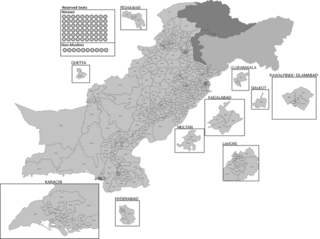
General elections are scheduled to be held in Pakistan less than 60 days after the dissolution of the National Assembly, which is set to dissolve on 13 August 2023 upon completing its five year term, unless dissolved earlier, in which case the election shall be held within 90 days after dissolution according to the constitution. This means that the election must be held no later than 14 October 2023. The three major parties are Pakistan Tehreek-e-Insaf (PTI) led by Imran Khan, Pakistan Muslim League (N) (PML-N) led by incumbent prime minister Shehbaz Sharif and Pakistan Peoples Party (PPP) led by incumbent Foreign Minister Bilawal Bhutto Zardari.

In Pakistan, there are two laws governing Hindu marriages. One is the Sindh Hindu Marriage act of 2016 which is applicable in the Sindh province of Pakistan and another is the Hindu marriage act of 2017 which is applicable in Islamabad Capital Territory, Balochistan, Khyber-Pakhtunkhwa and Punjab provinces. However, there are no laws and amendments made to register a marriage between two Hindus- one from Sindh and another from a different Province.
















